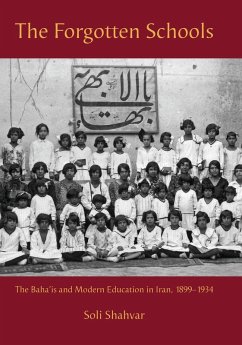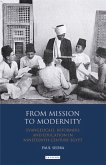By the end of the nineteenth century it became evident to Iran's ruling Qajar elite that the state's contribution to the promotion of modern education in the country was unable to meet the growing expectations set by Iranian society. Muzaffar al-Din Shah sought to remedy this situation by permitting the entry of the private sector into the field of modern education and in 1899 the first Baha'i school was established in Tehran. By the 1930s there were dozens of Baha'i schools. Their high standards of education drew many non-Baha'i students, from all sections of society.Here Soli Shahvar assesses these 'forgotten schools' and investigates why they proved so popular not only with Baha'is, but Zoroastrians, Jews and especially Muslims. Shahvar explains why they were closed by the reformist Reza Shah in the late 1930s and the subsequent fragility of the Baha'is position in Iran.
Bitte wählen Sie Ihr Anliegen aus.
Rechnungen
Retourenschein anfordern
Bestellstatus
Storno









